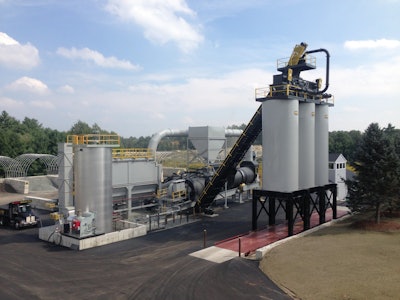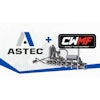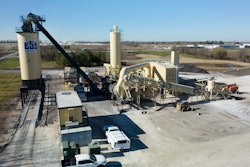
There is a lot that’s involved with the purchase of an asphalt plant, but perhaps the most difficult and overwhelming part is obtaining the proper permits to be able to operate. Once you have the permits in place to operate, there is also a lengthy to-do list to make sure your asphalt plant maintains compliance.
Plant owners and operators are busy and sometimes these important steps to operating your business can be overlooked. Many producers may not even know their permits have expired. However, it’s important to ensure you have obtained, and maintain, your permits to ensure you stay in compliance and avoid hefty fines.
Obtaining Proper Permits
Depending on where you are located, obtaining the permits to operate an asphalt plant can be a daunting process. When looking to purchase an asphalt plant, make sure you partner with your manufacturer from the beginning. Asphalt plant manufacturers have decades of experience in making sure you have the land and zoning required to operate a plant, and can help you obtain the proper permits required to operate.
The first step is to know which plant you are hoping to purchase before you begin the permitting process. The type of system you want to build will determine many factors in obtaining the initial operating permits.
On your application for a permit to operate, you need to be able to address the following:
Plant layout.
Emissions points of equipment
Site plan
Flow diagram
Fuel type(s)
Estimated emission levels.
Noise levels depending on location.
Height restrictions (if applicable)
Safety plan
Spill plan (if applicable)
Traffic flow pattern
Stormwater permit
Before you can move a single bucket of dirt, you need to have the above planned out and plant manufactures work with their customers to assist with these processes.
To obtain more complex permits, manufacturers may also suggest potential asphalt producers hire a consulting agency to help as well.
“Air permits are the number one permit we help obtain, Jim Euler, President of DECA Environmental says. “this has been a requirement at asphalt plants and you have to allow 120 or more days to get the permit issued, depending on public comment. SPCC plans are required for AC tanks and fuel tanks and stormwater plans are also required by all States.”
Things you need to know during your air permit application:
Capacity of Production: ton/hr
Control Equipment: Baghouse or wet scrubber.
Number of Silos
Fuel Source:
Nat Gas
Propane
Fuel Oil
Waste Oil
Paved / Unpaved Roads on the site
Once the air permit application is completed, it is submitted to the State Air Permit department. A specific permit writer will review the application and most often has follow-up questions that are technical in nature. These can relate to how specific Rules factor in or site specific requirements, such as stack height above ground. YES, there is a Rule for that. Knowing how to answer these questions may be the difference between having a burdensome permit or not.
Permitting is Different than Compliance
Obtaining permits is only half the battle. Regulations for permitting can change regularly and you need to know how to understand the permit and figure out what is required of you for reporting and record keeping.
For people who are not involved in the permitting process on a daily basis, it can seem unnecessarily complicated and overwhelming but consulting companies like DECA Environmental are experts in this field and work to ensure you are always compliant. Air emissions permits, for example, are often subject to State and Federal rules, besides the requirement to obtain a permit, so it makes sense to seek help in managing your emissions and reporting requirements.
“With an air permit, you have annual reports, tonnage reports, quarterly reports and more,” Euler says. “DECA environmental completes those detailed calculations based on your tonnage reports to create a record and keep you compliant.”
Record-keeping at the plant is a continual process that will help ensure you’re in compliance. Some records to keep in mind:
Quarterly Report for tons of production monthly
Quarterly Deviation Report
Visible Emissions from the baghouse Stack
Annual Compliance Certification (ACC)
DECA Environmental also recommends a Compliance Calendar to help maintain compliance by summarizing all of the report dates that is shared with the plant operator and owner ensuring these reports are submitted on time. Having this partnership helps relieve the stress of the “environmental compliance” factor.
Stack Testing Every Five Years
Your stack test is an important step to compliance and impacts your operations. The results of the test dictates HOW you are permitted to operate for the rest of the permitted period.
Preparation is crucial in the process of passing this test. It’s easy to overlook something and discover too late that you’re on the road to failing your test. You don’t have to go through this alone, however.
Many times your plant manufacturer will want to be on site a few days before the planned stack test to make sure the plant is meeting the most efficient running process possible. Technicians are willing to come out to conduct tests and make sure your plant is where it needs to be in order to pass. If you can’t have them on site, give them a call and have them walk you through the things you need to verify before the test day.
“A preventative maintenance plan is key to passing your stack test,” Euler says. “You need to make sure you’re changing your bags, tuning your burner and doing black light tests to make sure it’s working correctly.”
A consultant like DECA can also help coordinate these stack tests and verify your plant is ready to pass.
“We always recommend having an engineering test done before the official stack test,” Euler says. “A few runs can help determine if you’ll pass because if you fail your stack test, you’re going to have to pay that $10,000 again for another test.”
Also keep an eye on the weather as it’s a huge factor in stack testing, not only in regards to safety, but how much the moisture in the product affects the emissions in the stack. Any number of weather elements like temperature, barometric pressure and wind velocity need to be factored into stack testing.
You also need to make this a priority on the day of the test. You need to have enough production for three, 1-hour test runs and you want to be in control of that mix. Letting paving operations dictate production on this day is a recipe for disaster.
If you have to postpone the test for any reason and cannot meet the deadline, ask for an extension as soon as you can and always remember to ask for help when you need it.
Experienced consulting agencies can help coordinate the fine details of stack testing such as the coordination with the onsite State inspector, coordination between the stack testing group and the plant personnel and, coordinating the pace of production between the 1-hour runs since there is typically 45-minutes of changing equipment between runs.
Once the testing is completed, the samples are analyzed and the results are summarized in a Stack Test Report. The report is required to be submitted to the State within 45-days. Once the report is submitted and you already know the results Passed, then you can sit back and relax knowing your plant is in compliance.
“Small, straightforward operations and large, complex facilities all struggle with creating efficient and accurate processes to keep them in compliance,” Euler says.
Partnering with an expert in this area helps to ensure environmental compliance will is one less thing to worry about and you can focus on what makes money.




















